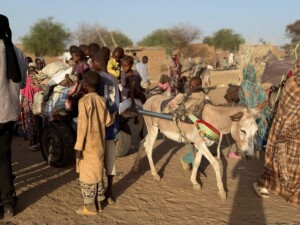Sudanese youth on police head-shaving campaign: ‘Better do it yourself’
On Monday, the police carried out a ‘head-shaving campaign’ targeting a group of young men at the Bahri Market in Khartoum North. In response, a group of young Sudanese decided be ahead of the police by shaving their heads themselves.
The practice is similar to what the now dissolved Public Order Police used to do, claiming to “maintain appearance in public places”.
In a mockery of the campaign, young men shaved their heads bald and published their photos on social media platforms with the hashtag #’shave bald, leave the public order out in the cold’.
 Youth shaved their hair to avoid being shaved by government forces, August 23 (Social media)
Youth shaved their hair to avoid being shaved by government forces, August 23 (Social media)
On Monday, the police carried out a ‘head-shaving campaign’ targeting a group of young men at the Bahri Market in Khartoum North. In response, a group of young Sudanese decided be ahead of the police by shaving their heads themselves.
The practice is similar to what the now dissolved Public Order Police used to do, claiming to “maintain appearance in public places”.
In a mockery of the campaign, young men shaved their heads bald and published their photos on social media platforms with the hashtag #shave bald, leave the public order out in the cold.
The Khartoum North Resistance Committees fiercely condemned the police campaign. One of its members told El Jerida newspaper that “We will not allow the notorious Public Order Law to return again. It is time to overthrow the regime”.
The Public Order Law was officially abolished in November 2019, after the downfall of Al Bashir. The system disproportionately affected women in the country.
Recently, the Sudanese Ministry of Interior established a new ‘Community Police’, which triggered widespread controversy in the country amidst fears that the decision will facilitate the return of the Public Order Police in Sudan.
Al Taghyeer newspaper also referred to the return of the Public Order Police on Tuesday, pointing to the recently established Community Police – although the Ministry of Interior more than once stated to the public that the new police force will be different from the Public Order Police.
The online newspaper Medameek reported that the police, apart from dispersing youth gatherings in Khartoum North, chased young women because of their allegedly indecent outfits and held tea and food vendors, confiscating their belongings.
In conjunction with the police campaign, the Khartoum state authorities announced they will close the food and beverage outlets on Tuti Island, where the White and Blue Nile intersect, which became a place for entertainment and concerts since the December 2018 revolution.
The Khartoum Security Committee said the decision to close the outlets following complaints of the residents of Tuti about the increased number of petty crimes on the island. The Ministry of Interior confirmed in a separate statement that the decision is concerned with “combating criminals, eliminating their hideouts, and preventing violence”.
Previously, police forces dispersed youth gathering on and near the Tuti bridge, which connects central Khartoum with the island, and stopped a public concert by singer Moataz Sabahi.
Footballers
Earlier this year, security forces launched a head-shaving campaign in El Obeid, capital of North Kordofan.
Among the victims were two members of the El Amal football team, that was visiting El Obeid for the Sudanese Premier League tournament, El Araby El Jadeed reported on February 22.
The incident provoked great discontent in political and sports circles, which prompted the North Kordofan police chief to visit the team and officially apologised to them.
Activists wondered why the police chief did not apologise to the other victims of the campaign that aimed, as they told El Araby El Jadeed, “to shave young people’s sense of power” in an attempt “to humiliate us” and “to break the movement rejecting the coup of the army leader Abdelfattah El Burhan” in October last year.
Activist Abdallah Bashir said that the shaving campaign was carried out by a joint force of army soldiers, security forces, paramilitaries of the Rapid Support Forces, and policemen in many places in the city, in particular in places where youth usually meet, in clubs and parks.

by security forces in Port Sudan, July 2017 (Social media)
Humiliation
During the era of dictator Omar Al Bashir, Radio Dabanga received more than once reports about the practice to shave heads of both men and women in order to punish them.
Residents of Port Sudan, capital of Red Sea state, for instance were beaten with whips and had their hair shaved because they allegedly violated a curfew in the city in July 2019. A female student had her hair cut as well for not covering her head.
During the violent dispersal of the Khartoum sit-in on June 3, protesters were (partly) shaved as well.
In September 2018, RSF members shaved the heads of young men with “deviant hair styles” in various neighbourhoods in Khartoum North. A month earlier, RSF forces seized secondary school students and shaved their heads in North Darfur’s Mellit.
In Northern State, dozens of youths and students were convicted to be shaved in public for their alleged odd haircuts and wearing of inappropriate dress in November 2017.
It seems that people may decide to humiliate others and shave their heads for a different reason, as Radio Dabanga reported in October 2017 that gunmen in Kutum, North Darfur, shaved the head of a 13-year-old girl because she belonged to a certain tribe.











 and then
and then